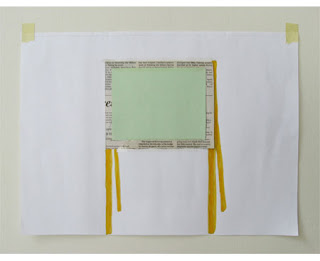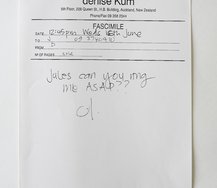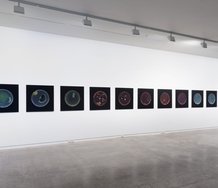John Hurrell – 24 March, 2009
History loses its attraction to any student who might study it. History is on trial and has lost its case. History that once spoke only of a Eurocentric master narrative has lost its credibility. Losing this credibility has helped history regain its appeal.
As teaching aids go the hinged particle board stand with four legs looks striking in the Window space. Normally it supports pinned up sheets of paper to be written or drawn on by a teacher - as Menzies’ preparatory collaged drawing above shows - but this time it presents one piece of light canvas on which are positioned 21 soft black fabric letters, cut out in solid caps. Nicely proportioned, they look good. The words they say: HISTORY LOSES ITS APPEAL.
That aphorism has a Jenny Holzer ring to it. It could almost be a ‘Truism.’ It has a witty layered quality that draws out different nuances.
History loses its attraction to any student who might study it. History is on trial and has lost its case. History that once spoke only of a Eurocentric master narrative has lost its credibility. Losing this credibility has helped history regain its appeal.
The phrase swirls around, weaving in and out all the implications that post-colonialism brings to bear on a once rigidly orthodox account of past narratives. It frees the way for overlapping but parallel clusters of new histories. Ones where words transmute: His Story becomes Her Story; Lose Loosens; Appeal becomes A Peel, A Peal. A celebration of a new order.
In the above drawing Menzies has a sheet of newspaper positoned under the upper green sheet. Her project extends that newspaper to the Library’s Level 1 with the journal and periodical collection. Two flyers bearing the same four words again, at each end of a shelf. They prod us to examine the contents of that shelf: the printed discussions’ staying power, their appeal.
- John Hurrell

 Advertising in this column
Advertising in this column Two Rooms presents a program of residencies and projects
Two Rooms presents a program of residencies and projects



This Discussion has 0 comments.
Comment
Participate
Register to Participate.
Sign in
Sign in to an existing account.